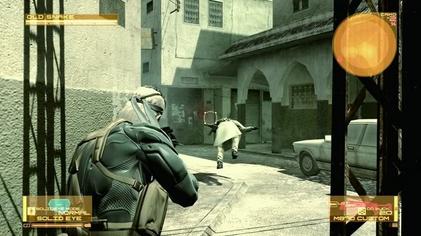Compared to other mediums, video games are still fairly new to the “entertainment medium” party. However, storytelling has existed since humans were able to communicate ideas to each other, so there are a few tried-and-true ways to convey a story effectively. Let’s talk about exposition in games: how its done, when it works, and when it really, really doesn’t.
One of the most important aspects of storytelling is the idea of “show, don’t tell.” Don’t tell the reader why they care about a character; show them the reasons the character is a great person and worthy of their emotional investment. This is done through exposition or narrative, which consists of details of the story that aren’t really pertinent to the main plot, but are overall important for character development, perspective, etc. These are the details like, “Joe was in a wheelchair. He had been in the war, and an explosive device mangled his legs. A number of his combat buddies died that day, and he was still upset about it, so he didn’t spend much time at home.” There, I told you.
That’s pretty boring.

Instead, you might show the information thus:
Joe sat at his usual table at the restaurant downtown. His cell phone rang, but he ignored it, knowing it was his wife wondering where he had gone this time. The waitress hadn’t commented on all the empty chairs around the table set for six, he noted. She was new; she didn’t know the faces that should have been here. With a gusty sigh, Joe locked the wheels of his chair. His hand found the scars on his leg where shrapnel had buried itself in a flash of burning and pain, before he forced himself to open his menu alone.
I conveyed the same information as the “tell” sentence, but never actually stated that his friends were dead, or that Joe had been a soldier, or that there had been an explosion, but I’m sure you were able to draw those conclusions for yourself.
Brief Sidetrack
As a side note, in an interactive medium like a video game, I would argue that it’s more important to “do, don’t show,” but that discussion is for another post entirely. Suffice it to say that in my mind, the video game storytelling hierarchy looks something like this:
DOING > SHOWING > TELLING
Back on Track and Back to the Games
Exposition in video games is used to convey details about the (usually unfamiliar) world the player will be inhabiting for the next twenty to one hundred hours. Because of their interactive nature, the games cannot rely on dialogue to illustrate every point, otherwise the game quickly becomes a movie, much like in Metal Gear Solid 4: Guns of the Patriots, which spent so much time explaining technology and conspiracies and connecting all the plot points of previous games that now, years after I played the game, I hardly remember the gameplay itself.

This is poor exposition in a video game.
Games, like movies, can use visual elements to convey certain details of the world without using words (Silent Hill 2’s oppressive setting comes to mind), but unlike movies can also incorporate interaction with the environment to convey the story.
Megan Man X is a great example of this. The first battle where you meet Zero illustrates just how powerless Mega Man is at the beginning of the game because you as a player experience that helplessness. And then, in one line, Zero assures Mega Man that he can one day be just as powerful. And then the powerups deliver on this; there is no sidekick interrupting your gameplay to say, “Hey, MegaMan, you powered up and can <fill in the blank> now!” Nope, you just saw it, and did it. The game designers trusted you to draw the conclusions for yourself (another important point that may come up in future posts).

Fantasy and science fiction genres are usually guilty of the “exposition dump” storytelling. Characters will soliloquy on topics that anyone who actually exists in that world should know about, because the player needs to know it. But do they? What is vitally important for the player to know, and what would be an extra bonus?
The Dragon Age series finds a good balance with this. I never felt over-burdened by information, even the first time I jumped into the series and was still fairly new to RPGs in general. I played Dragon Age: Origins on an old tube TV, so I didn’t even have the benefit of being able to read the codices (literally. The screen was too blurry), but I still found the world to be rich and engaging, simply from the careful word choices of the NPCs and the interactions I had with the environment. For me, the codices served to enhance the environment, not define it. I almost saw them as Easter eggs – little treats for the people who found them, but not integral to the story if you didn’t.

Comparatively, the exposition dump in a game like Two Worlds II was almost distracting, sitting through long conversations with NPCs who told me who I was, why I cared, where we were, and why that was important. I wasn’t even shown. I felt like the game sat me down and read part of a history book to me. I played the game for a few hours and didn’t really care about the characters, because after being informed of my affection for <fill in the blank> the game assumed I believed it and went merrily on its way.
Contrast this to, again, Dragon Age which gives some background via Duncan the Grey Warden, then gives you, the player, a “reason” to join the Wardens through short segment you play through (where either you (aka your avatar) are tainted by a cursed mirror, you family is betrayed and killed, you are kidnapped, you’re going to be executed, etc.). You are also given a reason to want to stop the Blight. Duncan – your mentor – and the king of Ferelden are massacred in a darkspawn attack, you and your new friend are almost killed, and I’ll show that archdemon who’s boss!

As a hobby writer, this is an aspect of gaming that is very important to me, and may be visited again. But, to summarize, I’ll leave it to Ernest Hemingway:
“If a writer of prose knows enough about what he is talking about he may omit things that he knows, and the reader, if the writer is writing truly enough, will have a feeling of those things as strongly as if the writer had written them.”
Thanks for stopping by, and I’ll see you soon!
–Athena Tseta
What’s next? You can like and subscribe if you like what you’ve seen!
You can also:
– Support us on Patreon, become a revered Aegis of AmbiGaming, and access extra content!
– Say hello on Facebook, Twitter, and even Google+!
– Check out our Let’s Plays if you’re really adventurous!


Great post! It’s funny how some of the elements you describe here have become almost a cliche in certain genres. JRPGs for instance often have that unwinnable battle early on with a major villain who flattens your entire party JUST IN CASE YOU WERE FEELING GOOD ABOUT YOUR CHANCES OF SAVING THE WORLD IN THE FIRST FIVE MINUTES. It’s definitely a lot less common in action games or platformers like Megaman X though, so that’s cool and I imagine very effective (not actually played X… *sheepish grin*)
Also, I think I agree in general with your principle about doing > showing > telling in games, although in practice I often prefer to give up control. The hard thing about doing everything in a game, particularly a story-driven one, is that the player will almost invariably have make a lot of decisions about what to do and how to do it and that can be stressful, and often not especially satisfying.
Anyway I hope you’ll post more on this topic going because I’m very interested in storytelling and these kinds of techniques in games, there’s so much to be said about the topic!
LikeLiked by 1 person
Hi! Thank you so much for your comment! You’re absolutely right, there are a lot of elements that have become “staples” of certain genres, for better and for worse, and I think we could have a very good discussion about their inclusion in games.
And it’s okay, I never actually finished Megaman X, either… long story. Also, I’m glad you wrote “Megaman.” I was 99% sure that was how it was supposed to be spelled, but then I saw an advertisement for “Mega Man” and wasn’t so sure anymore.
That’s a good point you make about too many choices. There is definitely a time and a place for things like cutscenes and for the game to gently guide you in the direction the storyline is trying to go. This brings up an interesting point about choice and agency in games, which I was thinking about addressing here down the line, so I’m pulling out a few games that I can use for reference. Stay tuned!
I’m so glad you like this topic! I’ll definitely be posting more on character development and exposition in games in the coming days and weeks. Thanks for commenting, and hope to see you again soon!
LikeLiked by 1 person
It sounds like you’ve got some great ideas brewing there – can’t wait! It’s just my general feeling that choice can be overwhelming and cause stress, and people put too much emphasis on it as a sign of a good game. I find in a game with too much choice I run to GameFAQs to figure out what the consequences are and determine the best way forward. It can be hard to just go with your gut if those choices have ramifications.
As for spelling, Mega Man X… Megaman X… it seems the former is what is used officially, but the latter is more convenient so I’m sticking with it 🙂
LikeLiked by 1 person
Hello, I noticed you liked my comment on another gaming bog and as is habit, decided to follow the trail back to your blog. Am glad I did. Very much enjoyed this blog. I remember having a discussion with one of my tutors about the evolution of literature (my degree) beyond books and ereaders, into things like games. He went with me as far as video games, he was less convinced about boards games (I guess he is a person who believes boardgames start with draughts and end with monopoly). Gonna follow you, and will reblog this post if you don’t mind (though I’ll do it tomorrow as I already have one scheduled today).
Given your interest in narrative/storytelling, you might like some of the posts on my blog http://www.itsmorethanjustgaming.com I have plenty there about gaming and my thoughts on it, but also a serial piece of fiction generated in response to playng a game (it is called the Mycroft Journals), Stop by and say hello
LikeLiked by 1 person
Hi John! Thanks for stopping by! I’m glad you liked the article. It’s one of the first ones I wrote, so I’m glad people are still finding relevant 🙂
I’m not surprised your tutor drew the line at board games. Like video games, it seems many people’s perceptions of board games are stuck in the past…
Checked out your blog, and I’m really enjoying reading through your game posts (and your fiction!). I’ll have to check out your Mycroft series when I have a little more time to sit and read a story.
Thanks for stopping by, and I’m glad to have you along for the journey!
PS You can absolutely reblog this post. I’m flattered you like it so much 🙂
LikeLike
Then, I shall reblog it tomorrow as I have nothing scheduled. I followed you earlier and will read more of your stuff soon
LikeLiked by 1 person
Incidentally, the Mycroft series will be an ongoing one – however, for reasons that will hopefully become clear, I would urge you to stick with it until the third part (already uploaded) as there is something in there that might specifically appeal to you. (Maybe it won’t but if it doesn’t grab you by then, well, not to worry)
LikeLiked by 1 person
You have my curiosity now. Can’t wait to check it out!
LikeLiked by 1 person
Reblogged this on It's More than Just Gaming and commented:
An article I found yesterday about storytelling in games. It’s pretty awesome, and there is more good stuff on the blog
LikeLiked by 1 person